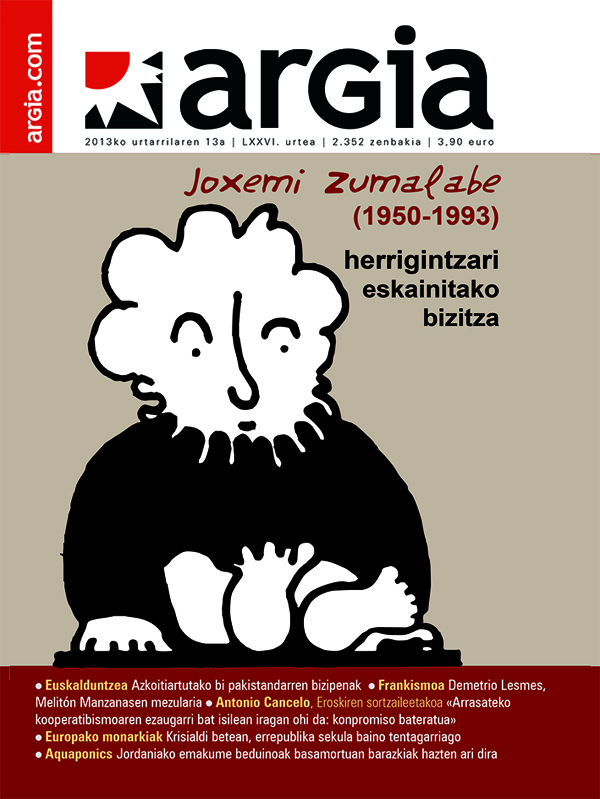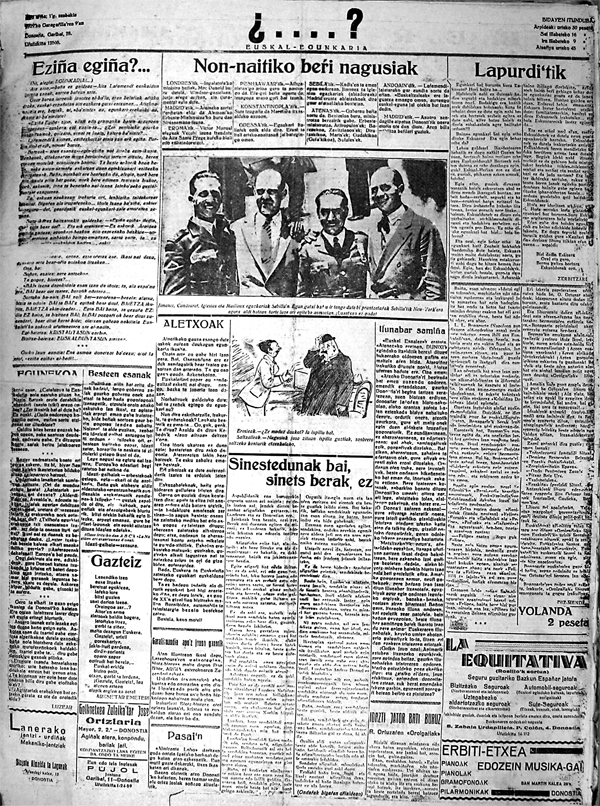Names and Surnames
- On the occasion of the Centenary, ARGIA organized a talk in the Archivo de Navarra on the trip to Origen that was made on February 23 by the Pamplona collaborator of the magazine Santi Leoné.

“The Biscayan and Sulatino, courageous and energetic, but at the same time rough, speak the same language, and only the space of a few days distinguishes one from another; in the nearby counties they use different words, but typical of the same language, to denominate the same things; the peoples that are very close are hardly understood, but they accept each other as brothers of a nation and of it.” Humboldt speaks in Die Vask's book. When he came to the Basque Country in 1799, in 1801, the most German, like the Basques of Axular, had different laws and kingdoms, and the dialects changed a lot from one place to another, but they also had a language that united everyone. If we did not find a word to name all those who spoke of Germans, Humboldt would be furious. Perhaps that is why he saw it so clear that "if we wanted to use a word to name all the lineages of the Basque nation, we would be in trouble"; "this poor people have also lost the unity of their name". In this passage, Humboldt recalls that in France Basques are called the Basques of Iparralde, and Biscayens are called the Basques of Hego Euskal Herria. In Spain, names per province are used: Vizcainos, Guipuzcoans, Alavés. Navarre does not appear in this reflection, although he will later mention some lines. Navarre was part of Vaskenland Humboldt, but Humboldt never walked Pamplona and Navarre barely did: It was in Roncesvalles, and yes, in Baja Navarra. In Die Vask's book, when analyzing the Powers, he will exclude those of Ipar Euskal Herria, since they were annihilated by the Revolution, but also those of Navarra, without giving explanations. Perhaps he came to the head of Germany: just as the Biscayan people attribute Prussian virtues – workers, serious ones – perhaps he saw Navarre as Austria of the Basque Country, a Catholic and decadent kingdom. If salvation came, it would come by Bizkaia / Prussia. In any case, although the nation of the Basques had no name – at least it did not include all the Basques – it was in Humboldt’s view.
A century later, Euskal Herria still had multiple names: Euskal Herria is there, but in Spanish they also used Vasconia and Euskaria. In the last years of the 19th century there is still an atmosphere in the air created by the Basques: Juan Iturralde and Suite, Arturo Campion, Hermilio de Oloriz. In order to use the words of sociologist and politician Iñaki Iriarte, the Basques, despite having failed in politics, won in culture. The Basque Country or the Basque Country – in upper case or lower case – or something Basque, a Basque thing, which also encompasses Navarre, there is a certain consensus around it, probably more in right-wing environments than in left-wing environments. The Carlists and the nationalists were united in that, although it was different what the content was giving to every Basque thing. This did not prevent them from establishing foreign alliances in politics. The creation of Eusko Ikaskuntza or Euskaltzaindia did not disturb the Diario de Navarra; the newspaper did not denounce, for example, the II Congress of Basque Studies. The Congress held in 1920 in Pamplona "as an attack from outside", but did so with satisfaction.
The first fractures will begin to appear over these years. The opening of the Spanish Catholic Centre will take place on 6 January 1921. The First World War has meant a communist revolution in eastern Europe and the creation of new states, following the disappearance of the Austrian Empire. That is why Victor Pradera will present at the opening conference of the Spanish Catholic Centre, that is why he has his name: Catholic, because we must oppose Atheist and Spanish communism in order to combat the danger posed by nationalism. The story also has to be read from these ideas, so San Francisco Javier and his whole family, like all those who fortified themselves in the castle of Amaiur in 1521, were traitors, because they attacked the Castellanos and tried to divert Navarre from their Spanish path. The words caused a great controversy: all against Pradera. All of them, not only nationalists Arturo Campión or Manuel Arantzadi, but also Carlists Ignacio Baleztena or José María Azkona. For his part, Eladio Esparza de Lesaka criticized Pradera in the Euzkadi of Bilbao. Later, Esparza would also be director of La Voz de Navarra.
Fifteen years later, some of the gentlemen who fought for the independence of Amaiur, as vigorously defended, as the Baleztenenses, in conspiracies to save Spain, or from the Diario de Navarra, would run a campaign against the Basque status – Eladio Esparza – and one of their animals, not the only one, would be Basque nationalism.
The history of a large part of Navarre society is the history of distancing: from a Basque idea, it is the history of distancing from the Basque people. In the same time that he denounced the Navarros gathered in Amaiur as traitors, Víctor Pradera had no problems defining himself as a Basque of Pamplona; a few years ago, in the 1980s, José Javier Uranga Olarra continued to proclaim Euskalherria – a cultural position, contrary to Euskadi politics – if we are tired of the pages today. This is the story of some Navarros political parties, a continual retreat from everything that has a Basque colour. So much so that some have had to change the name of the territory, of the territoriality, in order to attract the Navarros: Euskadi no, Basque Country no, Navarre is our homeland, our lost state. As in the Humboldt era, we still have many names, but we probably still exist. The Biscayan and the lean Sulatino spoke only one language; today, some do not know whether the unified Basque language and the dialect are a single language. Well, someday we'll have to talk not only about language, but also about territoriality, as Luistxo Fernández has asked. Meanwhile, from the hand of Argia we see independence every week and here we are, in Iruñea, in the 18th century, as claimed by Etxeberri de Sara and in the 20th Patxi Larrion, over the city of the Basques.
2019 has been a special year for ARGIA, an example of this is this number that you have in your hands. Turning a hundred years is not an easy achievement, even more so for a small media outlet in Basque. The celebrations have taken different forms throughout this year and, as... [+]
On the day of the presentation of book 111 Hostoz eta Orriz we had the opportunity to learn about the culture of Duzunaritz. A delicious day to round off a series of celebrations that fill the century of Argia. I can't imagine a more beautiful path than to dirty the shoes in... [+]



















